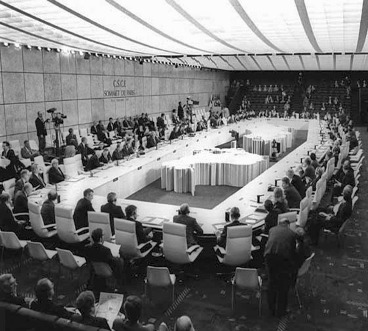Mr. Speaker, on October 4, a man of great knowledge, talent and dignity passed away. David Meredith Evans was an officer in the Foreign Service, serving his country in that capacity from 1963 until 1995. He was 64 years of age. I came to know him during his last assignment before retiring, when he served as the Senior Adviser on the staff of the Commission on Security and Cooperation in Europe, better known to us as the Helsinki Commission.
I was Chairman of the Helsinki Commission at the time and relied heavily on his expertise in the early 1990s, when the former Soviet Union and the countries of East-Central Europe were in a state of transition and, in some cases, turmoil. With the Cold War coming to a close, it was a challenge for many foreign policy experts to understand the new world into which we were heading. David, however, had a keen sense of where things were heading, both in terms of the wonderful possibilities and of the dangerous obstacles that stood in the way. Thanks in large part to him, the Helsinki Commission played a prominent role during that period: observing the first multi-party elections countries from the Warsaw Pact held in at least four decades; organizing congressional delegations to these countries to learn firsthand what was happening; attending meetings of what is now the Organization for Security and Cooperation in Europe (OCSE) to raise concerns about human rights violations in particular; and overseeing the drafting of Commission reports which helped educate policy-makers about what needed to be done.
David Evans had a strong background in Soviet and East European affairs going back to his education at Harvard University and his tours at the U.S. embassies in Moscow, Belgrade and Warsaw. He had focused considerably on economic and trade issues, and he understood early on that the entrepreneurial spirit and free market, not the collectivism and central planning of communism, were what the people in these countries needed. He further understood that this could not happen without the development of democracy, and he became a committed human rights advocate. Indeed, the Commission’s first encounters with David Evans were during OSCE negotiations on economic, scientific and environmental questions. Rather than pushing generic ‘international cooperation’ in these areas, he pushed for improved human contacts through developing the tourist industry; he criticized the Soviets for taking action against scientists like Andrei Sakharov who expressed independent political views; he promoted the right of environmental activists in the Soviet Union and East-Central Europe to raise their concerns without being punished by the state.
David also had a particular expertise on Yugoslav affairs, and while the violent demise of Yugoslavia beginning in 1991 had a strong affect on all of us, it brought him a personal anguish. He spoke the language fluently, traveled there frequently with the Commission staff and worked tirelessly to make us aware of what was happening and why. He was in Sarajevo in March 1992, when the city was first surrounded by Serb militants, and got a glimpse of the nightmare that Bosnia and its capital would have to endure one month later and the more than three years thereafter.
I worked mostly with David, however, in dealing with the break-up of the Soviet Union and the emergence of new countries about which we knew little. I can remember mostly his seriousness of purpose combined with a good sense of humor. Among other things, he introduced us all to the word `gefuffle,’ his description of a scene of chaotic confrontation where people are shouting at each other. And, as I said, he was a man of great dignity. He was, for example, generally conservative and formal in his attire. Still, he would travel to some of the muddiest, dustiest, dilapidated places in Europe without hesitation in order to carry out the Helsinki Commission’s mandate.
In the five years he was with the Helsinki Commission, the staff truly appreciated his presence and sense of purpose. They could rely on him to provide the direction and judgment needed to carry out their tasks. They could also count on his support for their efforts to promote human rights when those from other branches of government or countries sought to minimize human rights in international relations. Many of the same staff are still at the Commission, and kept in touch with him in his retirement. Indeed, he continued his activism during this period, working to preserve country estates and museums throughout Russia. Along with his wonderful family, friends, fellow foreign service officers and Commission staff, I will miss David Evans and will always remember and value his advice and presence while at the Helsinki Commission. He was, Mr. Speaker, an American who dedicated his life to representing his country and the ideals on which it is based, and I am grateful to have known him.






